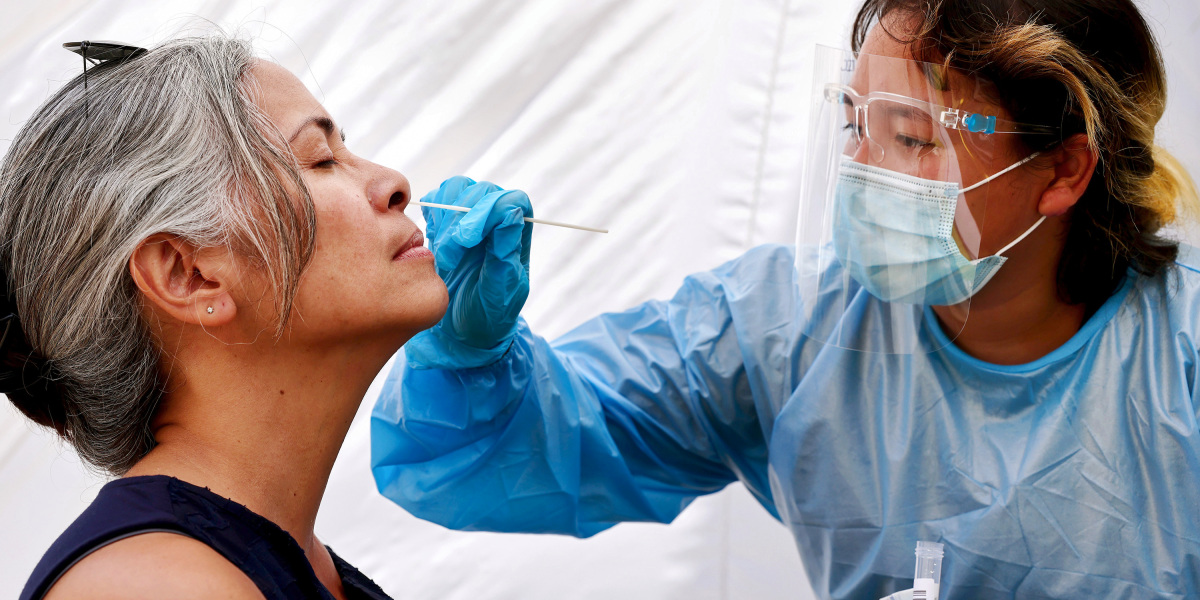[ad_1]
Covid cases in the United States have doubled in the past two weeks, and scientists are now striving to understand the delta variant, which appears to constitute the vast majority of new infections. It is alarming that delta is more contagious than other variants and also causes some symptomatic “breakthrough” cases in vaccinated people.
While vaccines still overwhelmingly prevent serious illness and death, the delta variant is changing the way we think about the spread of the coronavirus. Here are some answers to some important questions about what this all means.
1. What makes the delta variant more contagious?
The CDC estimates that the delta variant is nearly twice as contagious as previous versions of the virus. Researchers are still trying to understand the mutations that explain this, but preliminary research suggests that changes in its spike protein make it more efficient at both capturing receptors and entering your cells.
The delta variant also appears to result in a higher viral load than the other variants. Viral load is a measure of the amount of virus in the nose and throat. One study found that at the beginning of infection, people with the delta variant had a viral load 1000 times that of people infected with the original version of the virus. People with the delta variant also reached peak viral loads faster, according to this peer-reviewed study.
2. How do scientists actually determine how contagious the delta variant is?
The viral load helps us understand how contagious the virus is. Coronavirus infections are spread through aerosols and droplets when an infected person coughs, sneezes, or simply breathes, so the more viral particles enter the respiratory tract, the more likely that person will infect someone else.
To measure viral load, researchers use a laboratory method called polymerase chain reaction, or PCR. They take a swab from the infected person’s nose and extract any viral RNA that is on the swab. They then trigger a reaction that looks for the genetic material of the viruses and copies it over and over until there are enough copies for laboratory equipment to detect.
We usually focus on the end of the PCR — whether the test detects material from the virus that is positive. But researchers can also see how long it took for the machine to test positive – how many copies it took to bring the viral material to detectable levels. The fewer copies or cycles it takes to detect a virus, the more viral material there will be at the beginning.
This number of cycles, called cycle threshold, or Ct, has raised eyebrows at the Centers for Disease Control and Prevention. In a cluster of cases in Provincetown, Massachusetts, about 74% of affected residents of the state were vaccinated. People who contracted infections tended to have the same Ct values, regardless of whether they were vaccinated or not. The CDC thought this could be a sign that vaccinated people can transmit the virus, perhaps as easily as unvaccinated people.
3. Can I get COVID even if I am vaccinated?
Yes, it is possible, although your infection is likely to be much less severe than that of an unvaccinated person.
According to Liz Rogavsky McQuaid, an infectious disease researcher at the University of Virginia, the vast majority of infections still occur in unvaccinated people. According to a report by the Kaiser Family Foundation, US states tracking vaccination status of cases find that 94% to 99.9% of cases are in unvaccinated people. And among everyone who was vaccinated, 0.01% to 0.54% experienced a breakout.
Some studies have shown that vaccines are slightly less effective than the delta option, especially if you only received one dose of mRNA vaccine. But so far, it looks like vaccines are still working, especially in preventing many cases of serious illness, says Rogavsky McQuaid.
Vaccines may need a little extra help over time against the delta variant – some companies are pushing to strengthen the vaccine. But experts say there is no evidence yet that booster vaccines are needed, and WHO argues that initial vaccines for the rest of the world should take precedence over revaccines for people in wealthy countries.
4. What about the transfer? Can vaccinated people spread the delta variant?
This appears to be the case, but research is still in its infancy.
While Ct values can be used as proxies for viral load, there are several problems with trying to guess too much based on this number, especially when it comes to vaccinated people, according to Monica Gandhi, an infectious disease researcher at Monica Gandhi’s company. University of California, San Francisco.
First of all, PCR collects all kinds of genetic material, even from dead viruses. If your vaccinated immune system has begun to fight the infection, “you may have a lot of viral particles in your nose, but they may not work,” says Gandhi. To really find out how contagious someone is, you need to take these viruses and see if they are alive and capable of infecting people. According to Gandhi, the CDC noted that the data is still pending.
[ad_2]
Source link



